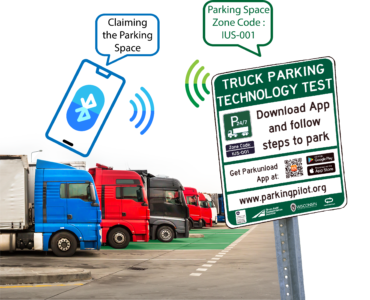
Researchers from the Texas A&M Transportation Institute (TTI) are teaming up with The University of Wisconsin–Madison and ParkUnload to conduct a truck parking pilot study to better understand how truck drivers use existing parking spaces and to test the benefits of using a mobile parking app. Funding for this study is provided by the Federal Motor Carrier Safety Administration (FMCSA) under a cooperative agreement through the agency’s FY20 High Priority grant program.
This week, select truck parking spaces along Interstate 80 (I-80) and 94 (I-94) will be painted green and signs instrumented with truck parking technology (i.e., Bluetooth® devices) will be installed. These devices will communicate with the ParkUnload app when a driver’s phone is in close proximity to the parking zone. Once the app detects the marked zone, the truck driver can park and check-in to the parking space on the app to let other drivers see information on remaining spaces. Signs will also provide drivers with additional information.
“Insufficient truck parking presents a safety hazard for all highway users when drivers park in unauthorized locations, drive when fatigued or drive past their hours of service to find safe parking,” says Transportation Specialist Brian Routhier, from the FMCSA Technology Division. “We’re hoping this study will provide a better understanding of the truck parking needs along these corridors and whether a truck parking app is beneficial to drivers.”
Drivers who travel along the I-80 and I-94 corridors can get started and participate in just three steps:
- download the ParkUnload app;
- park and check-in to the parking space in the app; and
- when leaving, check-out in the app.
“For the pilot to work, we need drivers to download the app and check-in when they park in a designated parking space,” says TTI Senior Research Scientist Jolanda Prozzi, lead researcher on the study. “If we can collect actual, on-the-ground information, then we can better understand, plan for and prioritize truck parking investments.”
To learn more about the study, visit https://parkingpilot.org/.